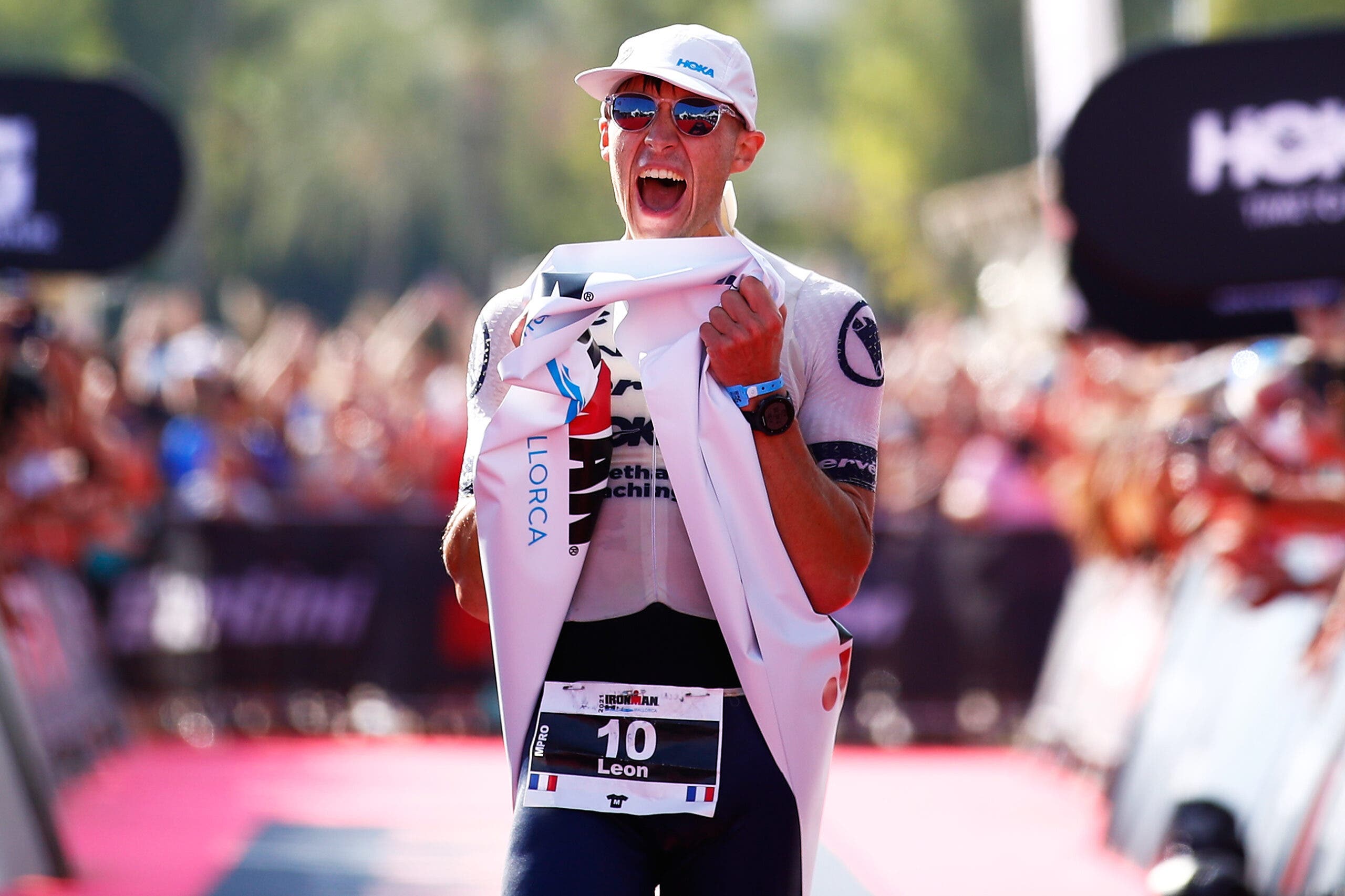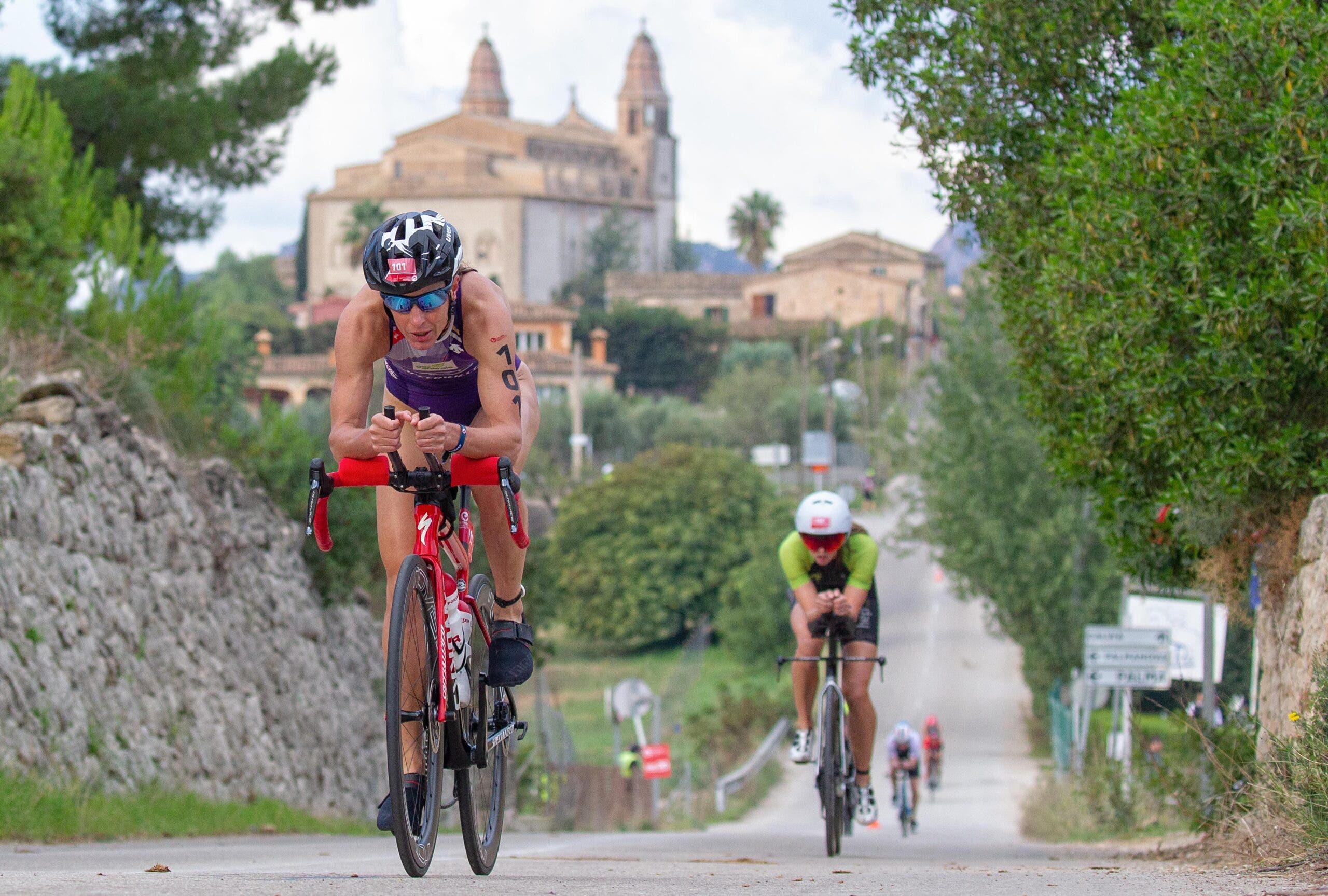Last Weekend Now: Too Many Races in Mallorca in One Weekend

London 2012 Olympic gold medallist Nicola Spirig celebrates after taking another win - this time, at Challenge Peguera-Mallorca. (Photo: José Luis Hourcade)
Last Weekend Now is your Monday rundown of what’s happening in pro triathlon, brought to you with commentary by Brad Culp. (Ed note: So yell at him if you don’t like the comments.)
The major players in the triathlon universe have done a remarkable job of coming together for the greater good over the past ten years. Ironman and World Triathlon (you can still call it ITU) actually started speaking again after a decades-long holdout. And they get along quite well, because it turns out they both like triathlon and money. Ironman and Challenge have even managed to coexist somewhat peacefully, and by that I mean they don’t purposefully pit events against one another. That is, until last weekend, on a tiny Spanish island in the Mediterranean.
Before we get into what happened in the professional races at Ironman Mallorca and Challenge Peguera-Mallorca, let’s try to make sense of how these races came to happen on the very same day, even though there’s no sense to be made.
If you haven’t been to Mallorca, it’s as perfect as it probably seems (as long as you don’t go to Magaluf). It’s inarguably one of the best places on earth to ride a bike, and it has one of the most sport-centric cultures on earth. It’s also about a quarter of the size of the Big Island of Hawaii, and while it has a lot more roads and people (about five times as many of each), it also has a climate that gives organizers a roughly nine-month window to put on an event.
This makes it possible for dozens of triathlons to coexist peacefully on this tranquil little isle. The full-distance Ironman Mallorca, which typically takes place in May, was postponed due to never-ending COVID-19 restrictions. As they looked for a new date in the fall, they settled on the third Saturday in October, which has always been the date of the half-distance Challenge Peguera-Mallorca. It’s worth noting that these two events took place about 50 miles from each other, and athletes competing in one event had no idea there was another happening on the opposite side of the island.
So why does any of it matter? Isn’t it a good sign that two high-profile events could take place in such close proximity at the very same time? Maybe. But it’s also a sign that triathlon remains among the most siloed sports on earth. By spacing these events a week or two apart, both could have been lifted up with additional race entries, deeper professional fields, and better sponsorship activation. These are two major events on the Spanish triathlon calendar. Marquee Spanish brands, like Orbea, would normally have a big presence at both. Now those brands are forced to pick one or pull back their commitment to both. Even boxing—the most siloed sport on earth—doesn’t put on two competing heavyweight title fights on the same night, because they want both to be as big as possible.
Surely local governments played a big role here. It’s not like Ironman just got to pick any weekend to reschedule their race. And hopefully this was just a one-off thing because of COVID-19, and not a sign that Ironman is going back to the dark ages of training to assassinate the local competition.
With that, here’s what actually happened at the races.

A nail-biter at Ironman Mallorca
Taking place in Alcudia, which is perhaps the most popular resort town on the island for vacationing cyclists, Ironman Mallorca began as a full in 2014, switched to a 70.3 in 2017, and returned as a 140.6-mile race this year.
Britain’s Ruth Astle, who is still the reigning overall age-group Kona champ, won the first professional Ironman of her career, winning a nail-biter of a race that saw the top four women all finish within three-and-a-half minutes of each other. After swimming near the back of the pack, Astle somehow managed to ride faster than professional cyclist/triathlete Lisa Norden, which put her at T2 four minutes behind the Swedish Olympic medalist.
Astle tracked Norden down shortly after the halfway point of the marathon, but then had to worry about a pair of women behind her running even faster. At one point, her lead over France’s Justine Mathieux came down to just 30 seconds, but she managed to hang on to win by more than a minute and collect the $15,000 top prize. Germany’s Kristin Liepold was another two minutes back in third, with Norden hanging on for fourth.
The men’s race also had a professional cyclist in the mix in the form of Australian Cam Wurf, but unlike Norden, he found himself with plenty of company at the front of the very challenging bike course. Wurf was in a virtual tie with France’s Leon Chevalier and Denmark’s Kristian Hogenhaug at T2, but it was Chevalier first onto the run course and that was the last he’d be seen all day.
Even though he slowed to a walk with just a mile left to run, the Frenchman hung on for the first Ironman win of his career. (He did win the full distance Embruman in France in August.) Germany’s Florian Angert, who has quietly climbed his way up to #11 in the PTO World Rankings, ran his way up into second, finishing just 56 seconds back after an incredible 2:43:46 marathon. Wurf marched his way through the marathon to cling to third, proving that being mediocre at two sports is almost as worthwhile as being good at one.
Chevalier now sits just outside of the top 20 in the PTO Rankings, which is remarkable given he started the year ranked 420th, having made just one pro start. Angert’s performance will move him up to #8 for the time being, which would mean a nice $40,000 bonus if he can remain there.

Spirig’s streak continues at Challenge Peguera-Mallorca
An hour’s drive from Alcudia is Peguera, and like every beach town in Mallorca (aside from Magaluf), it’s an ideal place for a triathlon. Even though Challenge Peguera-Mallorca offered a quarter of the prize purse as big brother on the other side of the island, it only required half the miles and still brought out a top-notch pro field.
Two-time Olympic medalist Nicola Spirig—also currently ranked #11 in the PTO World Rankings—put the cherry on top of the best season of her long-course career. She’s raced six times in 2021, winning on five occasions (all at the 70.3 distance). The only race she didn’t win was the Tokyo Olympics, where she finished sixth. Not bad, super mom.
Swiss countrywoman Imogen Simmonds kept the living legend honest on the run, finishing less than two minutes down. Both Swiss women were forced to run down Britain’s Lucy Hall, who posted both the fastest swim and bike splits of the day before fading to third. Hall is currently #27 in the PTO rankings and has been racing furiously to climb as high as possible before the $2 million year-end bonuses are paid out. There’s big incentive for athletes to climb into the top 20 right now, as it means a bonus check of at least $10,000 instead of $5,000.
Germany’s Frederic Funk has done just that, entering last weekend ranked #19 in the world. He could creep up another spot after a narrow win in Peguera over American Collin Chartier. The 24-year-old Funk has low-key been one of the best triathletes in the world over this distance in 2021, and he was voted “coolest name in triathlon” by writers of this column. It’s Funk’s third Challenge victory of the season, which also sets him up nicely to take home a big chunk of Challenge’s $150,000 end-of-season bonus too.
In third was Denmark’s Magnus Ditlev, who won, lost, and then re-won Challenge Budva-Montenegro over the course of last week. He originally won the race, then was found to have been led astray on the run course by the lead cyclist and was disqualified, then was reaffirmed the winner after cooler heads prevailed. I get that athletes are supposed to “know the course,” but so should the lead cyclist and they should definitely have GPS helping them along the route. It’s 2021. If we can launch William Shatner into space, surely we can get a cyclist to meander around a 13-mile course without messing up.